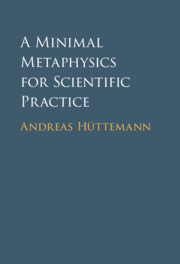Book contents
- A Minimal Metaphysics for Scientific Practice
- A Minimal Metaphysics for Scientific Practice
- Copyright page
- Contents
- Figures
- Acknowledgements
- Introduction
- Chapter 1 Laws of Nature and Their Modal Surface Structure
- Chapter 2 The Problem of Ceteris Paribus Clauses
- Chapter 3 Causation – Conceptual Groundwork
- Chapter 4 Causation – Application and Augmentation
- Chapter 5 Reductive Practices
- Chapter 6 Reduction and Physical Foundationalism
- Chapter 7 Reduction and Ontological Monism
- Chapter 8 Concluding Remarks: Methods and Epistemic Sources in Metaphysics
- Bibliography
- Index
Chapter 1 - Laws of Nature and Their Modal Surface Structure
Published online by Cambridge University Press: 04 August 2021
- A Minimal Metaphysics for Scientific Practice
- A Minimal Metaphysics for Scientific Practice
- Copyright page
- Contents
- Figures
- Acknowledgements
- Introduction
- Chapter 1 Laws of Nature and Their Modal Surface Structure
- Chapter 2 The Problem of Ceteris Paribus Clauses
- Chapter 3 Causation – Conceptual Groundwork
- Chapter 4 Causation – Application and Augmentation
- Chapter 5 Reductive Practices
- Chapter 6 Reduction and Physical Foundationalism
- Chapter 7 Reduction and Ontological Monism
- Chapter 8 Concluding Remarks: Methods and Epistemic Sources in Metaphysics
- Bibliography
- Index
Summary
In Chapter 1, I start by analysing the role of generalisations in scientific practice. Law statements or generalisations are involved in one way or another in explanation, confirmation, manipulation or prediction. I argue that these practices require a particular reading of the generalisations involved, namely, as making claims about the behaviour of systems. These practices therefore presuppose the existence of systems or things. Next, I look at the modal surface structure associated with laws. I use the term ‘surface structure’ to indicate that this structure may or may not be reduced to non-modal facts – as the Humean has it. I will sideline the debate about whether Humeanism is a tenable philosophical position. The positive claim I advance is that the modal surface structure can be explicated in terms of invariance relations – where I take invariance to be a modal notion.
- Type
- Chapter
- Information
- A Minimal Metaphysics for Scientific Practice , pp. 11 - 37Publisher: Cambridge University PressPrint publication year: 2021

